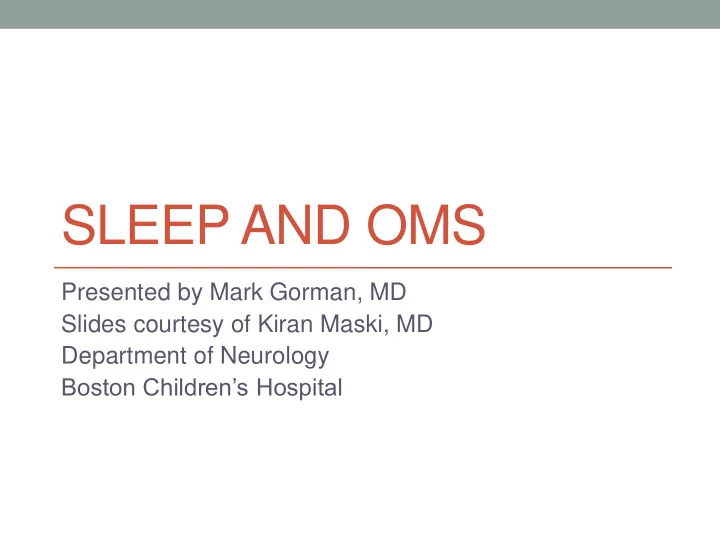

SLEEP AND OMS Presented by Mark Gorman, MD Slides courtesy of Kiran Maski, MD Department of Neurology Boston Children’s Hospital
Insomnia Diagnosis A. The patient/ patient's parent or caregiver observes, one or more of the following: 1. Difficulty initiating sleep. 2. Difficulty maintaining sleep. 3. Waking up earlier than desired. 4. Resistance to going to bed on appropriate schedule. 5. Difficulty sleeping without parent or caregiver intervention. B. The patient has a consequence because of sleep problems (fatigue, mood, cognitive, energy) International Classification of Sleep Disorders, version 3
Insomnia Diagnosis C. The reported sleep/wake complaints cannot be explained purely by inadequate sleep opportunity or inadequate circumstances (i.e. environment) D. The sleep disturbance and associated daytime symptoms occur at least three times per week. E. Sleep problems and consequences have been present for at least three months
Chronic Insomnia-Subtypes • In younger children: • Limit setting type : characterized by bedtime stalling or bedtime refusal that is the result of inadequate limit setting by a caregiver • Sleep-onset association type : characterized by the child's dependency on specific stimulation, objects, or settings for initiating sleep or returning to sleep following an awakening • In adolescents: • Psychophysiologic insomnia more common
Clinical Tools for Diagnosis • Polysomnography • Not recommended as an assessment tool for insomnia • Sleep logs/diaries • Most helpful if kept over 2 week period • Actigraphy • Clinically useful wrist watch tool that measures sleep and wake periods • $, time intensive to score and read, no reimbursement • Questionnaires • PROMIS Sleep Disturbances Index (5-18 years) • Kotagal S et al. AASM Practice Parameters 2012
Consequences of poor sleep in children • Daytime fatigue and sleepiness • Executive functioning impairments • Working memory • Sustained attention • Distractibility • Mood problems • Bi-directional relationship with depression and anxiety • Irritability • Aggression • Limited coping capabilities/tantrums • Poor sleep in early childhood is associated with long-term difficulties with sleep • Quality of life/family functioning difficulties
Sleep problems and OMS • Sleep disturbances most commonly described as insomnia • Difficulties fallings asleep and/or staying asleep at night • Sleep problems commonly co-occur with neuropsychiatric problems (obsessive convulsive disorder, rage attacks) • Rage attacks were more likely if <10 hours nocturnal sleep • Obstructive sleep apnea has been reported • Low muscle tone may contribute to upper airway floppiness • Sleep problems are among the most challenging problems for patient families to cope with!
Why are sleep problems common among patients with OMS? • Possible disruptions in monoaminergic neurotransmitters (norepinephrine, serotonin, dopamine) • May result in sleep disturbances and rage attacks • Steroids (or ACTH)! • Common side effects include sleep and behavior problems • Frequent hospitalizations • Many pediatric patients develop separation issues from parents and poor sleep post-hospitalization • Frequent outpatient visits/therapy sessions can disrupt normal nap schedule in younger children
Treatments • trazodone (only medication studied for pediatric OMS) • Study Design: Open label study of 51 patients with OMS (mean age 4.3 years; range 1.7 to 17 years) • Intervention: Start 25 mg and titrated up to 100 mg (toddler/pre- school); 50 mg-150 mg used for older kids • Outcome: Subjective sleep as reported by parent Pranzatelli MR. J Pediatr 2005
Treatments: trazodone • Results: • Mean duration of trazodone use was 1.1 years (1-6 mg/kg) • Improved sleep and behavior improved in 95% of participants with OMS • Total sleep time increased by 72% • Number of awakenings decreased by 76% • Rage attacks reduced by 33% • Reduced snoring (improved upper airway flexibility • Side effects: dry mouth, dizziness • More rare AEs Priapism, prolonged QTc and seizure not reported
Other sleep aids are available • Melatonin • Can be useful for sleep onset • Extended release • Discrepant animal data whether has pro- or anti-inflammatory effects; overall not specifically avoided by most providers • Clonidine • Can be useful for sleep onset; relatively short acting • Guanfacine • Can be useful for wakings; longer acting than clonidine • Less commonly used: gabapentin, clonazepam, risperidone
Suggested approach to insomnia in OMS • Detailed sleep history • Behavioral sleep approaches • Medications • 1 st line melatonin • 2 nd line clonidine and/or guanfacine • 3 rd line gabapentin • 4 th line trazodone
Recommend
More recommend